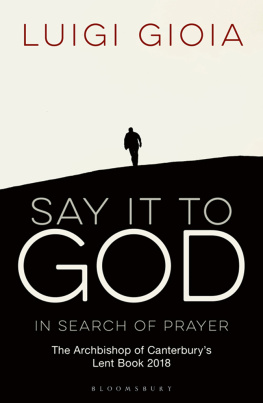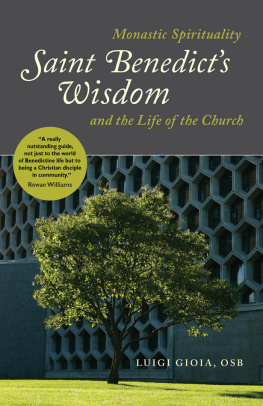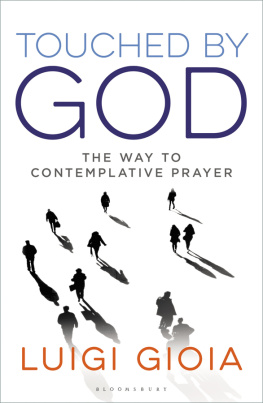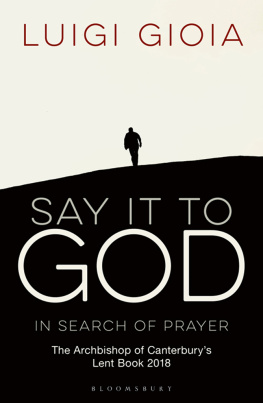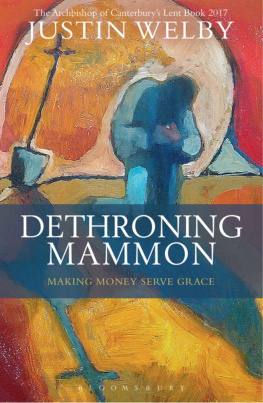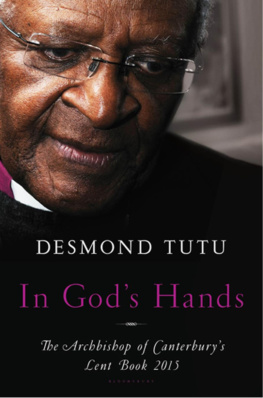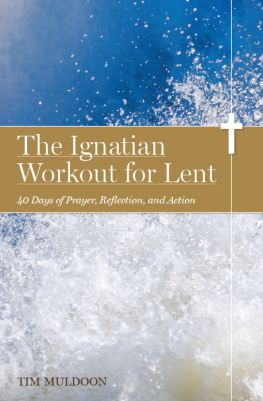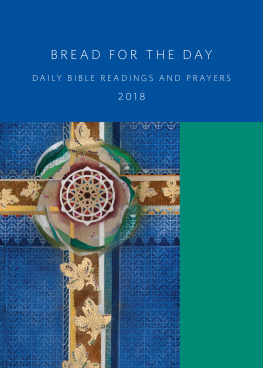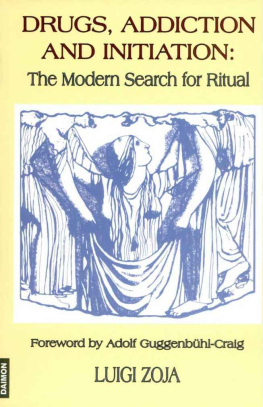Luigi Gioia - Say it to God : In Search of Prayer: The Archbishop of Canterburys Lent Book 2018
Here you can read online Luigi Gioia - Say it to God : In Search of Prayer: The Archbishop of Canterburys Lent Book 2018 full text of the book (entire story) in english for free. Download pdf and epub, get meaning, cover and reviews about this ebook. year: 2017, publisher: Bloomsbury Publishing, genre: Religion. Description of the work, (preface) as well as reviews are available. Best literature library LitArk.com created for fans of good reading and offers a wide selection of genres:
Romance novel
Science fiction
Adventure
Detective
Science
History
Home and family
Prose
Art
Politics
Computer
Non-fiction
Religion
Business
Children
Humor
Choose a favorite category and find really read worthwhile books. Enjoy immersion in the world of imagination, feel the emotions of the characters or learn something new for yourself, make an fascinating discovery.
- Book:Say it to God : In Search of Prayer: The Archbishop of Canterburys Lent Book 2018
- Author:
- Publisher:Bloomsbury Publishing
- Genre:
- Year:2017
- Rating:3 / 5
- Favourites:Add to favourites
- Your mark:
- 60
- 1
- 2
- 3
- 4
- 5
Say it to God : In Search of Prayer: The Archbishop of Canterburys Lent Book 2018: summary, description and annotation
We offer to read an annotation, description, summary or preface (depends on what the author of the book "Say it to God : In Search of Prayer: The Archbishop of Canterburys Lent Book 2018" wrote himself). If you haven't found the necessary information about the book — write in the comments, we will try to find it.
Say it to God : In Search of Prayer: The Archbishop of Canterburys Lent Book 2018 — read online for free the complete book (whole text) full work
Below is the text of the book, divided by pages. System saving the place of the last page read, allows you to conveniently read the book "Say it to God : In Search of Prayer: The Archbishop of Canterburys Lent Book 2018" online for free, without having to search again every time where you left off. Put a bookmark, and you can go to the page where you finished reading at any time.
Font size:
Interval:
Bookmark:

SAY IT TO GOD
To Pauline Matarasso
For her friends a grace
To Bram and Peter
Certainty wells up within


Lord, teach us to pray. These words of Jesus disciples still resonate today. If were honest, most of us would admit that prayer is not always easy, or enjoyable, and rarely comes naturally. We struggle with distractions, anxious thoughts and commitments. This book agrees! Prayer is tough. And the author does not try and give easy solutions. Instead, he takes us on a journey through great prayers from Scripture. The Psalms. The prayers of Old Testament prophets. But most of all, the prayers of Jesus. In the prayers of Jesus we discover our identity as children of God. We discover that prayer is not about us making efforts to knock on the door of a God too busy or distant to listen, but instead, that it is responding to a God who has already started the conversation with us. A God who wants nothing more than to spend time with us, help us grow, and surprise us.
Surprises are not always welcome. Sometimes the God we find in prayer is not the Santa-like God we wish he was. This God stretches us, challenges us and leads on unexpected paths. Luigi Gioia encourages us to respond to Gods prompting, to face what gets in our way and to follow with child-like trust to explore a new way of being with God: to pray as, and with, Jesus, in freedom and trust. This book is therefore a perfect companion for Lent: a book to lead us through an examination of our lives, of its priorities, and to encourage us to hear the God who is already speaking. The final chapter captures the book beautifully: when it comes to prayer, keep it simple, keep it short, keep it real. And as we bring the whole of ourselves before God, he answers the prayer we started with Lord, teach us to pray.
++Justin Cantuar
Lambeth Palace
January 2017
What is prayer really about? Not prayers, but prayer, not just saying things to God but touching God or rather being touched by him. What does an authentic prayer, a prayer that truly relies on the power of the resurrection, look like?
We should beware of our search for the best place, for the ideal conditions and for the perfect way to pray. This might lead us to forget a basic law of Christian prayer: prayer is always already there, already going on in our heart, wherever we are, whatever we do, whatever our feelings. The moment we realize this, we are praying. Great saints have often spoken of prayer being like breathing or having to become like breathing; that is something that should stay with us always.
Here I want to share a personal story.
I am seventeen, my faith has just come alive, I have discovered the Psalms and fallen in love with them, and have just read a wonderful book on prayer. So I try to enter into the habit of praying daily, or having my daily quiet time as some people nicely call it. And, well, it works! The five minutes a day I had decided to devote to prayer soon seem too short: they become fifteen, twenty, twenty-five minutes. I add five more minutes every day and I am not bored, I love it, it gives me so much peace, so much joy.
Those first lucky days, for a reason I do not remember, I had my home all to myself, so I could enjoy all the silence and the peace I wanted. But this blessed time was not going to last... I have three siblings, younger than me, the little one was two or three at the time love them to pieces, but they could be so annoying, bless them.
So imagine the scene: I shut myself in my room, I sit on a chair, I read a psalm, re-read it, a sentence strikes me, I close my eyes and try to repeat it gently with my heart. My siblings are playing hide and seek, one of them is unhappy about something, they start arguing. The little one starts crying and comes banging at my door: so frustrating... I still try to keep focused, but am increasingly angry, exasperation mounts and at one point I end up shouting at my siblings to shut up, not once but several times, until, discouraged and ridden with guilt for losing my temper, I give up!
This scene occurs two or three times until, at the end of that week, I talk about the experience with a Benedictine monk. In the course of that conversation I receive an unforgettable lesson about prayer. As I vent to him my frustration and ask forgiveness for having got angry, he tells me the story of a Christian in Vietnam during a time of persecution. He was arrested because of his faith and spent several years in the tiniest cell, impossibly overcrowded with robbers, murderers and other criminals.
When, decades later, he was finally released, he said that prayer, deep prayer of the heart, had never left him in that prison and that, far from distracting him, noise, discomfort, shouting and every sort of misery he had suffered there had become the fuel of his prayer not an obstacle, but the medium through which he learnt how to pray. So, this Benedictine monk ended up saying to me: the test that your prayer is authentic is learning how to turn everything into prayer. Any scrap of wood is good to feed fire, he told me. This was the great lesson of my life about prayer.
Let us think about this by questioning our preconceived ideas about prayer. How often do we abandon all attempt to pray in certain places, situations or contexts because we think that prayer is about focus, about having the right feelings, being in the right mood, creating the ideal conditions and having a lot of free time. Here is a litany of the obstacles to prayer: I dont have time; I am constantly surrounded by city, noise, people; I am stressed and under pressure; I am angry, annoyed, frustrated; I feel depressed.
What if we could understand noise not as that despite which we pray, against which we pray, but that out of which we pray? What if anger, jealousy, frustration all those feelings that overwhelm each one of us several times a day what if such feelings not only ceased to be an obstacle to prayer but became the scraps of wood that feed our prayer, that keep the fire of prayer burning?
Try this: each time I feel angry, I express my anger to God, I tell God why I am angry and with whom. Is this not prayer? Each time I am frustrated or discouraged, I tell God how and why. Again: is this not prayer? Each time something has hurt me, something pains me, I tell it to God, I simply say it, to God. And just in the same way, when something has given me a great joy, when I have succeeded in something and am happy about it, I take a few seconds to thank the Lord: is this not prayer too? Start doing this and you might end up praying a hundred times a day, and if you add up all these scraps, you might discover that you have spent much more time in prayer than you would have done in the best of your quiet times.
Never should we think that we have to overcome our anger first, or our frustration first, before we can pray. It can be difficult to believe it, but God is sincerely, deeply interested in each of our thoughts, the good ones and the bad ones, in every one of our feelings, the nice ones and the mean ones: all of them!
Of course, the obvious question here is: what is it then that turns them into prayer? When is it that anger is only anger, and when does it become prayer? Or when is pain only pain? Or when is lust only lust (because yes, lust too can become prayer)? Or when is hatred only hatred, and when does it become prayer?
Next pageFont size:
Interval:
Bookmark:
Similar books «Say it to God : In Search of Prayer: The Archbishop of Canterburys Lent Book 2018»
Look at similar books to Say it to God : In Search of Prayer: The Archbishop of Canterburys Lent Book 2018. We have selected literature similar in name and meaning in the hope of providing readers with more options to find new, interesting, not yet read works.
Discussion, reviews of the book Say it to God : In Search of Prayer: The Archbishop of Canterburys Lent Book 2018 and just readers' own opinions. Leave your comments, write what you think about the work, its meaning or the main characters. Specify what exactly you liked and what you didn't like, and why you think so.

